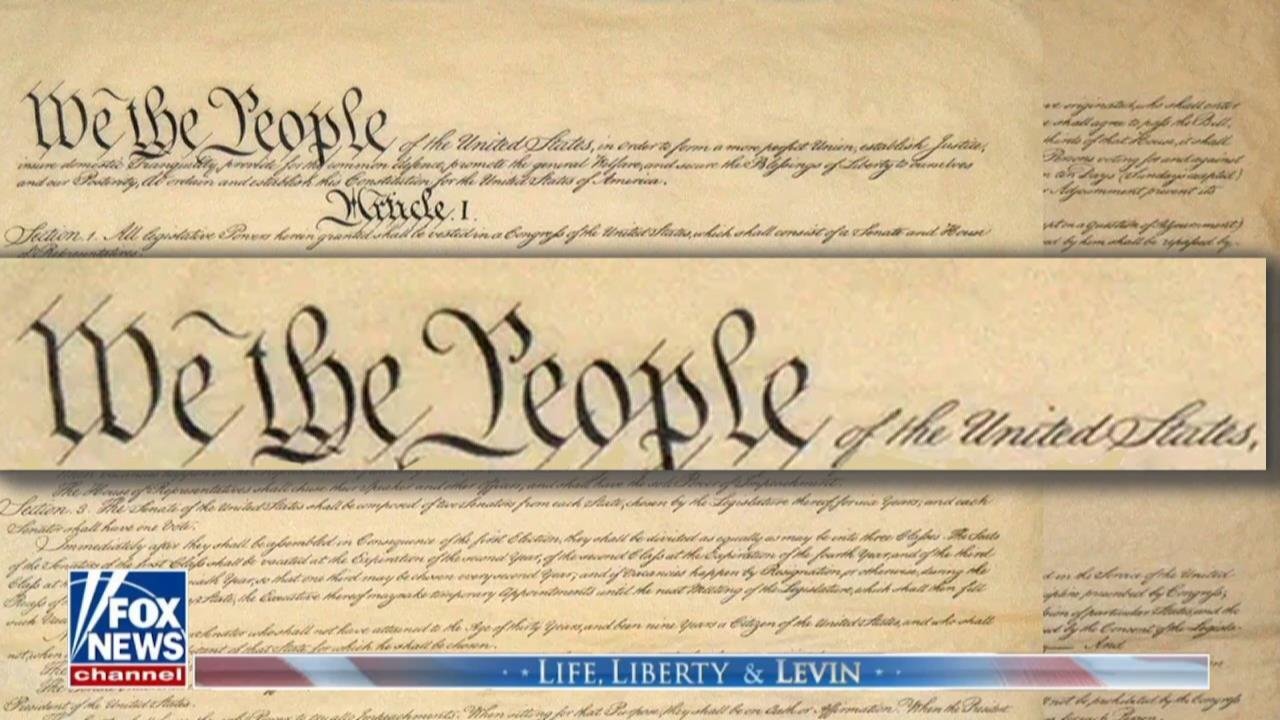Premium Only Content

What is meant by "due process" (per Mark E. Levin) April 26, 2025
Bud Meyers (Op-Ed) The first 7 words of the U.S. Constitution reads: "We the People of the United States", not "We the People of the World" The words "People" and "Persons" are U.S. citizens, not illegal aliens. The term "due process" is mentioned twice and related to their right life, liberty and property, not deportation.
1) Did the approximately 15 million migrants that the Biden administration had allowed into the country apply for relief from removal?
2) And if so, did Biden administration schedule a "merits hearing" or "individual calendar hearing" for the approximately 15 million migrants?
3) And if so, did an IJ (immigration judge) review evidence and consider legal arguments before making a decision on whether they could legally stay in country before the Trump administration came into power?
If the anwser is "NO" to any of the above, they can be deported.
The legal concept of "due process" was derived from the Magna Carta and adopted to the U.S. Constitutional as a protection against the government from denying a person of their life, liberty, or property without due process of law. Deporting migrants who break U.S. immigration laws by not applying for permission to be in the country is legally considered an illegal alien and can be deported . . . and are NOT being deprived (per se) of life, liberty or property. [They're just being held as temporary guests of the U.S. government until they can get a free ride back to their home country. The are given the same basic care as any legal immigrant would receive.]
Also, in addition to existing law: The Alien and Sedition Acts (1798) gives a U.S. President the unilateral authority to deport any non-citizens. The Supreme Court never ruled on the constitutionality of the Alien and Sedition Acts. (And with the current SCOTUS, that would be extremely risky!)
https://constitutioncenter.org/the-constitution/historic-document-library/detail/the-alien-and-sedition-acts-1798
Furthermore . . .
The U.S. Code, specifically Title 8, Chapter 12 (Immigration and Nationality Act), allows for the deportation of aliens (non-citizens) who are considered deportable due to various reasons. This includes those present in violation of U.S. law, those who have committed certain criminal offenses, and those who fail to comply with visa requirements. The Immigration and Nationality Act also outlines the process for removal proceedings, including the right to apply for relief from deportation.
The INA, a federal law, provides the legal framework for determining whether an individual is removable from the United States
Initiating Removal Proceedings:
The process typically starts with the Department of Homeland Security (DHS), or a relevant agency, filing a Notice to Appear (NTA) with the Executive Office for Immigration Review (EOIR). The NTA is the formal charging document, outlining the reasons why the individual is believed to be removable. The NTA is served on the individual, who is then referred to as the "respondent" in the removal proceedings.
DUE PROCESS ----------------------------
Removal Hearings:
The removal proceedings usually begin with a Master Calendar Hearing before an Immigration Judge (IJ).
At this hearing, the IJ explains the charges, the nature of the proceedings, and the respondent's rights, including the right to counsel.
The respondent has the opportunity to admit or deny the charges and may request an interpreter if needed.
If the respondent is not represented, the IJ must provide a list of free or low-cost legal service providers.
If the respondent denies the charges or wishes to apply for relief from removal, a "merits hearing" or "individual calendar hearing" will be scheduled.
At the merits hearing, the IJ will hear testimony, review evidence, and consider legal arguments before making a decision.
Relief from Removal:
The INA outlines various forms of relief from removal, such as cancellation of removal, adjustment of status, and asylum, among others.
Respondents may apply for relief, and the IJ will consider their application based on the evidence and legal arguments presented.
Consequences of Removal:
If the IJ finds the respondent removable and an order of removal is issued, the respondent has the right to appeal.
Failure to depart the United States under the order of removal can result in civil and criminal penalties.
END DUE PROCESS ----------------------------
Overview
Due process for American citizens ("We the People of the United States...) as enshrined in the Fifth and Fourteenth Amendments of the U.S. Constitution, is a fundamental principle of fairness in legal proceedings, ensuring that government actions don't arbitrarily deprive individuals of life, liberty, or property. It encompasses both procedural due process (fair procedures) and substantive due process (protection from unreasonable government actions).
Elaboration:
Fairness and Equity:
Due process guarantees that legal matters are resolved according to established rules and principles, ensuring individuals are treated fairly.
Procedural Due Process:
This aspect focuses on how the government makes decisions that affect an individual's rights. It requires that individuals be given proper notice, an opportunity to be heard, and a decision by a neutral party.
Substantive Due Process:
This part protects individuals from government actions that infringe upon their fundamental rights, such as the right to privacy or freedom of speech, even if the procedures are followed.
Historical Roots:
The concept of due process has roots in English common law, particularly in the Magna Carta.
EXPLAINED: The Magna Carta, signed by King John of England in 1215, established the principle of "law of the land," which is the precursor to the modern concept of due process. It ensured that no free man would be deprived of life, liberty, or property without due process of law.
Constitutional Protection:
The Fifth Amendment restricts the federal government, while the Fourteenth Amendment extends these protections to state and local governments.
Examples in Practice:
Due process plays a critical role in criminal proceedings, ensuring fair trials, the right to counsel, and the right to a speedy trial. It also applies to civil cases, where it ensures that individuals are given fair notice and an opportunity to be heard before their property or other rights are taken away,
The first seven words of the U.S. Constitution: "We the People of the United States..."
* These words and terms are NOT in the U.S. Constitution: foreign-born, immigrant/s, immigration, migrant/s, alien/s, non-citizen/s
* These words and terms ARE in the U.S. Constitution: citizens, persons, people
* the term "due process" is mentioned twice. (5A and 14A)
11th Amendment "The Judicial power of the United States shall not be construed to extend to any suit in law or equity, commenced or prosecuted against one of the United States by Citizens of another State, or by Citizens or Subjects of any Foreign State."
Ronald Reagan Library: "Amendment Eleven to the Constitution was ratified on February 7, 1795. It renders the states immune from lawsuits from out-of-state citizens and foreign individuals. The states also do not have to hear lawsuits filed against them when the charges are based on federal law."
Article III Section 1 - The judicial Power of the United States, shall be vested in one supreme Court, and in such inferior Courts as the Congress may from time to time ordain and establish. The Judges, both of the supreme and inferior Courts, shall hold their Offices during good Behaviour, and shall, at stated Times, receive for their Services, a Compensation, which shall not be diminished during their Continuance in Office.
Section 2 - The judicial Power shall extend to all Cases, in Law and Equity, arising under this Constitution, the Laws of the United States . . .to Controversies between a State, or the Citizens thereof, and foreign States, Citizens or Subjects.
Article IV Section 2 - The Citizens of each State shall be entitled to all Privileges and Immunities of Citizens in the several States.
Fifth Amendment - No person shall be held to answer for a capital, or otherwise infamous crime, unless on a presentment or indictment of a Grand Jury, except in cases arising in the land or naval forces, or in the Militia, when in actual service in time of War or public danger; nor shall any person be subject for the same offence to be twice put in jeopardy of life or limb; nor shall be compelled in any criminal case to be a witness against himself, nor be deprived of life, liberty, or property, without due process of law; nor shall private property be taken for public use, without just compensation.
14th Amendment - Section 1 All persons born or naturalized in the United States, and subject to the jurisdiction thereof, are citizens of the United States and of the State wherein they reside. No State shall make or enforce any law which shall abridge the privileges or immunities of citizens of the United States; nor shall any State deprive any person of life, liberty, or property, without due process of law; nor deny to any person within its jurisdiction the equal protection of the laws.
Section 2 - Representatives shall be apportioned among the several States according to their respective numbers, counting the whole number of persons in each State, excluding Indians . . . the basis of representation therein shall be reduced in the proportion which the number of such male citizens shall bear to the whole number of male citizens twenty-one years of age in such State.
Section 5 - The Congress shall have power to enforce, by appropriate legislation, the provisions of this article.
15th Amendment - Section 1 = The right of citizens of the United States to vote shall not be denied or abridged by the United States or by any State on account of race, color, or previous condition of servitude.
Section 2 - The Congress shall have power to enforce this article by appropriate legislation.
19th Amendment - The right of citizens of the United States to vote shall not be denied or abridged by the United States or by any State on account of sex. Congress shall have power to enforce this article by appropriate legislation.
24th Amendment - Section 1 - The right of citizens of the United States to vote in any primary or other election for President or Vice President, for electors for President or Vice President, or for Senator or Representative in Congress, shall not be denied or abridged by the United States or any State by reason of failure to pay poll tax or other tax.
Section 2 - The Congress shall have power to enforce this article by appropriate legislation.
26th Amendment - Section 1 - The right of citizens of the United States, who are eighteen years of age or older, to vote shall not be denied or abridged by the United States or by any State on account of age.
Section 2 - The Congress shall have power to enforce this article by appropriate legislation.
Source: U.S. Constitution
https://constitutioncenter.org/the-constitution/full-text
#BudMeyers: "Your honor, I rest my case."
* Democrats demand due process for #migrants, but not for #JocelynNungaray
https://rumble.com/v6smczb-dems-demand-due-process-for-migrants-but-not-for-jocelyn-nungaray-april-26-.html?e9s=src_v1_upp
-
 LIVE
LIVE
RealAmericasVoice
2 days agoHOME OF REAL NEWS
25,922 watching -
 27:00
27:00
BonginoReport
3 hours agoRest In Peace Charlie Kirk - Nightly Scroll w/ Hayley Caronia (Ep.131) - 09/10/2025
112K195 -
 1:20:06
1:20:06
Kim Iversen
3 hours agoRIP Charlie Kirk: When Words Fail, They Reach for Guns
82.5K112 -
 LIVE
LIVE
The Jimmy Dore Show
3 hours agoCharlie Kirk SHOT During Utah College Event! Rand Paul Has PROOF Fauci Lied About Deleting Emails!
10,142 watching -
 2:47:04
2:47:04
DDayCobra
4 hours ago $12.26 earnedCharlie Kirk SHOT
85.3K29 -
 LIVE
LIVE
LFA TV
13 hours agoBREAKING: CHARLIE KIRK ASSASSINATED - WEDNESDAY 9/10/25
2,502 watching -
 1:14:30
1:14:30
Redacted News
3 hours agoBREAKING! CHARLIE KIRK SHOT BY ASSASSIN IN UTAH, TRUMP CALLS FOR NATIONAL PRAYERS
197K362 -
 3:50:27
3:50:27
Right Side Broadcasting Network
9 hours agoLIVE REPLAY: Latest News from the Trump White House - 9/10/25
324K86 -
 1:12:05
1:12:05
vivafrei
7 hours agoLegacy Media is the Enemy of the People! Israel Stikes Qatar, U.S., Gets Mad! AOC So Stupid & MORE!
134K75 -
 52:13
52:13
The Quartering
6 hours agoRace War Nears, Russia Makes Huge Mistake, Fauci Bombshell & More
181K86